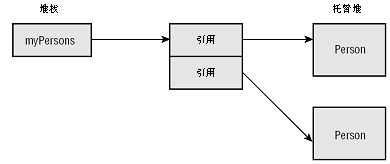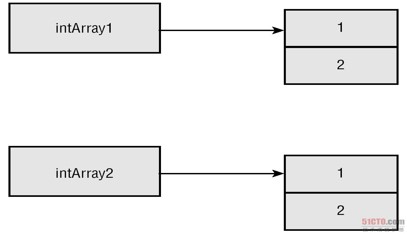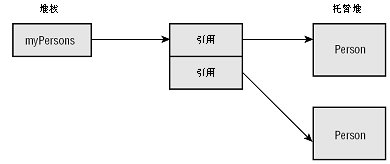C# custom type arrays and Array class
Array of custom type
using System;
namespace ConsoleApplication4
{
class Program
{
static void Main(string[] args)
{
Person[] myPersons = new Person[2];
myPersons[0] = new Person("Lilian", "Chen");
myPersons[1] = new Person("1", "2");
Console.WriteLine(myPersons[0].ToString());
Console.WriteLine(myPersons[1].ToString());
// 对自定义类型使用数组初始化器
Person[] persons = new Person[] {new Person("a", "b"), new Person("c", "d")};
Console.WriteLine(persons[1].ToString());
Console.ReadLine();
}
}
public class Person
{
public Person()
{ }
public Person(string firstName, string lastName)
{
this.FirstName = firstName;
LastName = lastName;
}
public string FirstName
{
get;
set;
}
public string LastName
{
get;
set;
}
public override string ToString()
{
return String.Format("{0} {1}", FirstName, LastName);
}
}
}Note: If the elements in the array are reference types, memory must be allocated for each array element.
myPersons is a variable stored on the stack that references an array of Person elements stored on the managed heap. Each item in the array references a Person object.

Create an array
Declaring an array with [] is a notation for using the Array class in C#, and a new class derived from the abstract base class Array will be created behind the scenes. This allows you to use the methods and properties defined by the Array class for each C# array.
The Array class is an abstract class, so you cannot use the constructor to create an array. But in addition to creating an array instance using C# syntax, you can also create an array using the static method CreateInstance() (which can be used if the type of the element is not known in advance).
using System;
namespace ConsoleApplication5
{
class Program
{
static void Main(string[] args)
{
// CreateInstance 方法的第一个参数是元素的类型,第二个参数是数组的大小
Array intArray = Array.CreateInstance(typeof(int), 5);
for (int i = 0; i < intArray.Length; i++)
{
// 使用 SetValue() 方法设置值
intArray.SetValue(i, i);
}
for (int i = 0; i < intArray.Length; i++)
{
// 使用 GetValue() 方法读取值
Console.WriteLine(intArray.GetValue(i));
Console.ReadLine();
}
// 将已经创建的数组强制转换成声明为 int[] 的数组
int[] intArray1 = (int[])intArray;
Console.WriteLine(intArray1.Length);
}
}
}Use the CreateInstance() method to create multi-dimensional arrays and non-0-based arrays:
using System;
namespace ConsoleApplication4
{
class Program
{
static void Main(string[] args)
{
int[] lengths = { 2, 3 };
int[] lowerBounds = { 1, 10 };
Array racers = Array.CreateInstance(typeof(Person), lengths, lowerBounds);
racers.SetValue(new Person("a", "b"), 1, 10);
racers.SetValue(new Person("c", "d"), 1, 11);
racers.SetValue(new Person("e", "f"), 1, 12);
racers.SetValue(new Person("g", "h"), 2, 10);
racers.SetValue(new Person("i", "j"), 2, 11);
racers.SetValue(new Person("k", "l"), 2, 12);
Person[,] racers1 = (Person[,])racers;
Person first = racers1[1, 10];
}
}
public class Person
{
public Person()
{ }
public Person(string firstName, string lastName)
{
this.FirstName = firstName;
LastName = lastName;
}
public string FirstName
{
get;
set;
}
public string LastName
{
get;
set;
}
public override string ToString()
{
return String.Format("{0} {1}", FirstName, LastName);
}
}
}Copy array
1) If the elements of the array are value types, all values will be copied
int[] intArray1 = { 1, 2 };
// 如果删掉 “(int[])” 会有 Error “Cannot implicitly convert type ‘object’ to 'int[]'”
int[] intArray2 = (int[]) intArray1.Clone
If the array contains If the reference type is a reference type, the element will not be copied, but only the reference will be copied. If you modify the attribute of an element in beatlesClone, the corresponding object in beatles will be changed.
Person[] beatles = { new Person("John", "Lennon"), new Person("Paul", "McCartney") };
Person[] beatlesClone = (Person[])beatles.Clone();
For more C# custom type arrays and Array class related articles, please pay attention to the PHP Chinese website!

Hot AI Tools

Undresser.AI Undress
AI-powered app for creating realistic nude photos

AI Clothes Remover
Online AI tool for removing clothes from photos.

Undress AI Tool
Undress images for free

Clothoff.io
AI clothes remover

Video Face Swap
Swap faces in any video effortlessly with our completely free AI face swap tool!

Hot Article

Hot Tools

Notepad++7.3.1
Easy-to-use and free code editor

SublimeText3 Chinese version
Chinese version, very easy to use

Zend Studio 13.0.1
Powerful PHP integrated development environment

Dreamweaver CS6
Visual web development tools

SublimeText3 Mac version
God-level code editing software (SublimeText3)

Hot Topics
 1387
1387
 52
52
 How to use various symbols in C language
Apr 03, 2025 pm 04:48 PM
How to use various symbols in C language
Apr 03, 2025 pm 04:48 PM
The usage methods of symbols in C language cover arithmetic, assignment, conditions, logic, bit operators, etc. Arithmetic operators are used for basic mathematical operations, assignment operators are used for assignment and addition, subtraction, multiplication and division assignment, condition operators are used for different operations according to conditions, logical operators are used for logical operations, bit operators are used for bit-level operations, and special constants are used to represent null pointers, end-of-file markers, and non-numeric values.
 What is the role of char in C strings
Apr 03, 2025 pm 03:15 PM
What is the role of char in C strings
Apr 03, 2025 pm 03:15 PM
In C, the char type is used in strings: 1. Store a single character; 2. Use an array to represent a string and end with a null terminator; 3. Operate through a string operation function; 4. Read or output a string from the keyboard.
 How to handle special characters in C language
Apr 03, 2025 pm 03:18 PM
How to handle special characters in C language
Apr 03, 2025 pm 03:18 PM
In C language, special characters are processed through escape sequences, such as: \n represents line breaks. \t means tab character. Use escape sequences or character constants to represent special characters, such as char c = '\n'. Note that the backslash needs to be escaped twice. Different platforms and compilers may have different escape sequences, please consult the documentation.
 The difference between char and wchar_t in C language
Apr 03, 2025 pm 03:09 PM
The difference between char and wchar_t in C language
Apr 03, 2025 pm 03:09 PM
In C language, the main difference between char and wchar_t is character encoding: char uses ASCII or extends ASCII, wchar_t uses Unicode; char takes up 1-2 bytes, wchar_t takes up 2-4 bytes; char is suitable for English text, wchar_t is suitable for multilingual text; char is widely supported, wchar_t depends on whether the compiler and operating system support Unicode; char is limited in character range, wchar_t has a larger character range, and special functions are used for arithmetic operations.
 The difference between multithreading and asynchronous c#
Apr 03, 2025 pm 02:57 PM
The difference between multithreading and asynchronous c#
Apr 03, 2025 pm 02:57 PM
The difference between multithreading and asynchronous is that multithreading executes multiple threads at the same time, while asynchronously performs operations without blocking the current thread. Multithreading is used for compute-intensive tasks, while asynchronously is used for user interaction. The advantage of multi-threading is to improve computing performance, while the advantage of asynchronous is to not block UI threads. Choosing multithreading or asynchronous depends on the nature of the task: Computation-intensive tasks use multithreading, tasks that interact with external resources and need to keep UI responsiveness use asynchronous.
 How to convert char in C language
Apr 03, 2025 pm 03:21 PM
How to convert char in C language
Apr 03, 2025 pm 03:21 PM
In C language, char type conversion can be directly converted to another type by: casting: using casting characters. Automatic type conversion: When one type of data can accommodate another type of value, the compiler automatically converts it.
 What is the function of C language sum?
Apr 03, 2025 pm 02:21 PM
What is the function of C language sum?
Apr 03, 2025 pm 02:21 PM
There is no built-in sum function in C language, so it needs to be written by yourself. Sum can be achieved by traversing the array and accumulating elements: Loop version: Sum is calculated using for loop and array length. Pointer version: Use pointers to point to array elements, and efficient summing is achieved through self-increment pointers. Dynamically allocate array version: Dynamically allocate arrays and manage memory yourself, ensuring that allocated memory is freed to prevent memory leaks.
 How to use char array in C language
Apr 03, 2025 pm 03:24 PM
How to use char array in C language
Apr 03, 2025 pm 03:24 PM
The char array stores character sequences in C language and is declared as char array_name[size]. The access element is passed through the subscript operator, and the element ends with the null terminator '\0', which represents the end point of the string. The C language provides a variety of string manipulation functions, such as strlen(), strcpy(), strcat() and strcmp().




